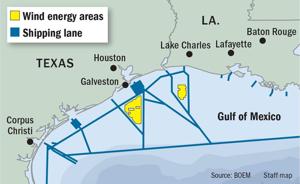
Offshore wind off the coast of Louisiana is taking off with incredible speed. On the Atlantic and Pacific coasts, plans to jump-start these industries have stalled over and over. Louisiana’s momentum, however, might be the tailwind America’s nascent offshore wind industry needed.
It’s not hard to see why this is the case. Louisiana is a working coast, with a proud and proven heritage for innovation and delivering energy to our nation. Critical to this century of success (and why investors see Louisiana as a safe bet) are Louisiana’s maritime and energy workforce. Our people know how to get the work done.
But you wouldn’t know that when attending the meetings addressing our transition to diversified energy sources. There are insights into how to negotiate the barriers to cleaner energy, expert opinions as to its financing and learned thoughts on its benefits, but only vague references to the “good jobs.”
The attendees have the best intentions while mapping out the path forward. But noticeably absent are the working people who will risk limb and life hoisting those giant turbines into place, building the Jones Act installation vessels, laying the cables, welding the pipes, building the installations or refitting the grid to accommodate this new energy.
There hasn’t been a frank discussion about what work in the energy industry looks like now, and what the future of work in energy should look like.
True Transition, an organization advancing policy that supports oilfield workers in their current industry and presents a path for new work in the emerging energy industries, has started that conversation. We recently hosted a roundtable where Louisiana oil and gas workers spoke about their lives in the industry. Even though the speakers held a broad array of political views, we found a lot of common ground to stand on. Job security, pay and safety were hulking issues.
True Transition just published a report based on a survey of more than 1,600 oilfield workers, those industrious souls who risk themselves drilling the wells and transporting the oil and gas to refineries, where refinery workers crack it into the constituent parts that make for modern life.
While the energy transition hasn’t really started yet, a jobs transition is well underway. As production has climbed, employment has dropped. More than half of the survey respondents had lost their jobs at least once prior to 2020, and more than half of workers lost their jobs in 2020.
Fewer hands mean more pressure on the crews, which increases risk and undermines safety: 45% of respondents believe that their company’s safety program was explicitly or implicitly designed to shift liability of an accident onto the worker. A quarter of survey respondents would hesitate raising workplace safety issues to management. For workers on the Gulf Coast, 37% would hesitate to raise a safety issue.
If employers don’t rehire to previous levels, workers were asked what training they wanted to transition into a new sector. They preferred opportunities that utilized existing skill sets like oil and gas well plugging, pipeline removal and electrical grid construction.
When asked what the government should do to help fired oil and gas workers, 51% said a federal jobs guarantee; 47% wanted direct federal employment plugging derelict wells; and 42% supported paid training to cross over to a new energy field.
This transition to new energy could be a bright opportunity for energy workers, but if they aren’t at the table, they’ll only get the scraps left over from the feast.
Oil workers sacrifice a large part of their lives to this work — sometimes, all of it. They shouldn’t sit by and watch themselves treated like coal miners who got a pat on the back and were told, “learn to code.” We owe workers a clear path to a decent life.
A true transition doesn’t just mean switching to clean energy, but shifting to a country that treats the people who create the wealth like the assets they truly are. Even if we can only get close, that kind of transition will be true enough.
Leo Lindner is an organizer for True Transition. He worked in Louisiana’s oil fields for 10 years, five of them on the Deepwater Horizon. Megan Milliken Biven is the founder of True Transition; she previously helped plan oil and gas lease sales with the Bureau of Ocean Energy Management.

Leave a Reply